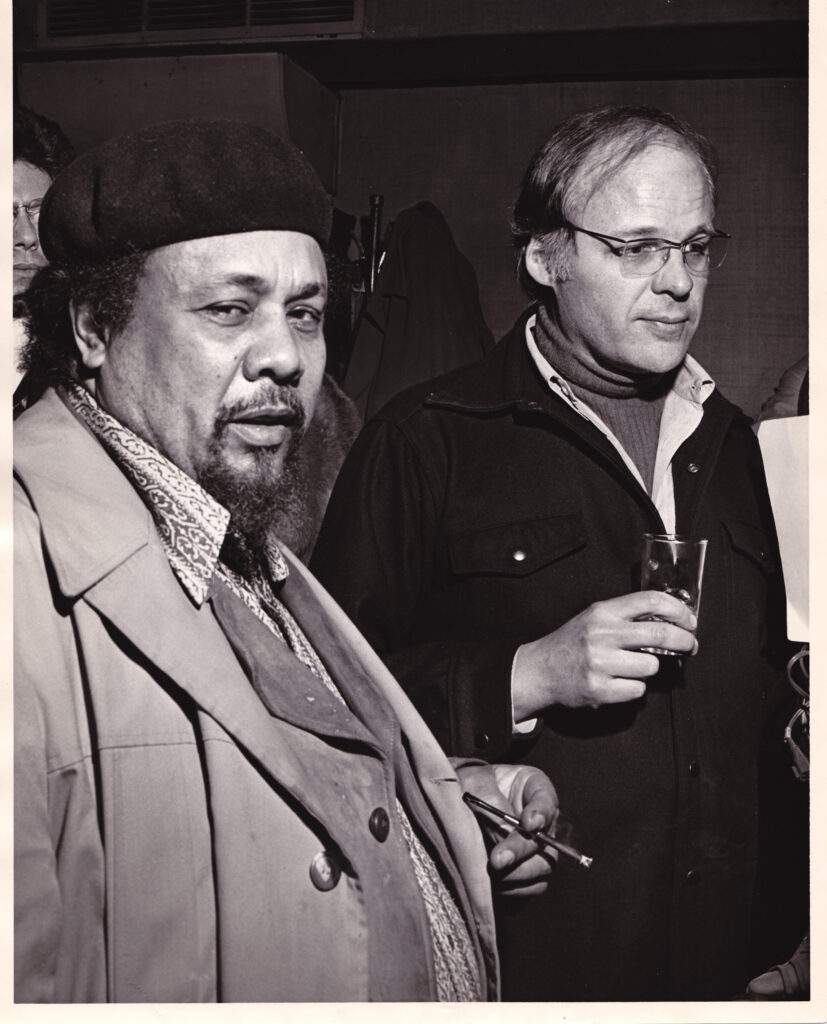
Let’s face it. There were few human beings who could give Charles Mingus what he needed (what he wanted? the universe can’t contain such multitudes and appetites); there were a relative handful who earned his trust and could meet him half-way, on his terms, and deliver the goods. Sy Johnson not only had the formula, he had a miracle or two up his sleeve, helping Mingus realize the impossible vision he had in mind for LET MY CHILDREN HEAR MUSIC.
Esteemed jazz critic Gary Giddins nails it: “He knew how to capture on paper exactly what Mingus wanted, and seemed to have stoked his ambition instead of trying to reduce it.” (NYT obit here.)
The result is sacred music, American art at its apex, and eternal props to Johnson for helping shepherd this lightning into sound. (Mingus, with relief and in the heat of that hurricane caught in a bottle, declared it “the best album I ever made.”)
For a cat who fired musicians mid-set, this speaks volumes. (A LOT more on Mingus here, here, and here. Some poetry, below.) And while Mingus had many (many) other masterpieces that could credibly be called his best work, we are fortunate it all came out right in the end. Also, not for nothing, the proceedings kick off with one of the all-time best titles of any composition, ever: “The Shoes of the Fisherman’s Wife are Some Jive-Ass Slippers.”
Charlie Mingus’s Miracle
The thing about Charlie Mingus Jr.—who clattered
onto the scene like a grand piano in a punch bowl—
is that he also was young once. More than that, fate
made him endure indignities that make a street bum
look like Reagan’s strapping young buck on food stamps,
savoring a T-bone. System so sullied even mobsters did
more than music critics, but you know, that’s entertainment.
I’m black, therefore I’m not: this is what four hundred years
of errors and trials—faith wrung out from unripened rinds—
forced folks with the nerve to be born neither wealthy nor white
to know from the get-go. And for the love of a stained-glass God,
don’t speak off-script or they’ll wash the mutiny from your mouth
with a firehose; that’s why most men lie down mutely in darkness,
safe or at least sheltered, beneath the underdog of hatred & history.
Get them to kill each other, or even better, hoodwink them
into hating themselves: that’s the anti-American Dream too
many citizens sleep through, fed a fixed diet of indifference,
intolerance, and interference. So what can you do if you know
you’re a genius, and all the klan’s men can never convince you
water isn’t wet? Keep rolling that rock up the hill until it grinds
a fresh groove into the earth: improvise your own force majeure.
This is almost my time, he said, and good God wasn’t he
more than half-right. I know one thing, (you can quote him)
I’m not going to let anyone change me. Overflowing with
awareness of himself, fresh out of the furnace, molded in
the image of a bird that flew first and further—mapping out
the contours of this new language: dialogic, indomitable—
his work exploded, a defiant weed cutting through concrete.
1957: five albums in twelve months—righteous waves
quenching a coastline, reconfiguring the world the way
Nature does. And his reward—a brief stretch in Bellevue,
ain’t that a bitch? Listen: when The Duke declared music
his mistress, he was lucky enough to need nobody, aware
that the genetic razor cleaving obsession and insanity is
capricious, like all those calamities Poseidon orchestrated.
Mingus was never not human, the impossible endowment
that drove him, destroyed him and, in death, restored him.
His tenacity was the heat that both healed and hurt, a comet
cursed with consciousness—he went harder, dug deeper,
even as his best work impended, yet-unrealized revelations:
Blues and Roots the brown man’s burden, a thorny crown
worn only by dispossessed prophets willing or able to testify.
His recalcitrant wisdom: earned the way trees acquire
rings: the reality of who he was, even if he too changed
at times, like the country that claimed him, mostly after
the fact. And whether you’re committed, an exiled crusader,
or a respectable suit working to death in squared circles,
the message from that rare bird’s song still resounds today,
an epiphany blown through the slipstream: Now’s the Time.
